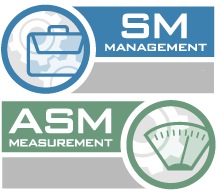SM/ASM 2003 - Software Management & Applications of Software Measurement

PRESENTATIONS
|
.Net-A Complete Development Cycle
This article discusses the software development practices that were used before the inception of .NET detailing which ones worked and which ones didn't. The .NET development lifecycle and how to implement it for your team is also explained. |
|
|
12 Steps to a Successful Metrics Program
Software metrics are an integral part of the state-of-the-practice in software engineering. More and more customers are specifying quality metrics reporting as part of their contractual requirements. Companies are using metrics to better understand, track, control, and predict software projects and products. This paper explains the basic concepts of metrics and measurement theory and how those |

Linda Westfall, The Westfall Team |
|
Applying Software Inspections Through the Software Lifecycle
Setting the priority and severity of a bug is a business decision. Changing business conditions impact the priority and severity of a bug. It's important to ensure that the staff that is assigning the priority and severity are aware of all relevant business drivers. This article discusses |

Robert Sabourin, AmiBug.com, Inc. |
|
Common Requirements Traps - And How to Avoid Them
This article details common requirements traps that teams fall into. Tips to help your team avoid these traps are also included. |
|
|
Creating a Great Team: Ready, Aim, Hire!
Create a great test team by: assessing your team to see where you need which kinds of strengths, defining the job you need filled, asking great interview questions to weed out unsuitable candidates, and by matching their answers to your needs. Every culture requires different personal preferences, qualities, and non-technical skills. Find out if your staff is properly skilled for the functions they are performing and learn how to place the right team members in the right positions. |

Johanna Rothman, Rothman Consulting Group, Inc. |
|
Creating an Error-Prevention Culture
Error prevention refocuses development teams from testing |
|
|
Gathering Requirements in a Low-Process Environment
Knowing the requirements for a system means understanding the problem to be solved. If the problem isn't understood, the solution can't address it. Not taking time for requirements discovery at the beginning will cost far more time and money in the end. This paper explains requirements gathering techniques. |

Elisabeth Hendrickson, Quality Tree Software, Inc. |
|
High-Maturity Measurement
This article will teach you how to: identify current problems with your organization's Level 3 implementation that will inhibit Level 4 implementation, explain the practices that are essential to implementing Level 4 |
|
|
Improving Measurement Capability
Following CMM can lead to improvements in: productivity, early detection of defects, reduction in time to market, and a reduction in post-release defects. Some indirect benefits can include: minimized risk through increased management visibility and tracking, and a framework for improvement and objective assessment/comparison. |
|
|
Integrating Risk Management into Your Project Plans
The goal of risk management is to develop information that supports informed decision-making. In this article you will: review risk management fundamentals, introduce simple quantification methods, discuss special "estimate" risks (cost & schedule), the impact integrating risk mitigation into project plans and share lessons from the real world. |

Payson Hall, Catalysis Group Inc |


